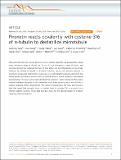Files in this item
Pironetin reacts covalently with cysteine-316 of α-tubulin to destabilize microtubule
Item metadata
| dc.contributor.author | Yang, Jianhong | |
| dc.contributor.author | Wang, Yuxi | |
| dc.contributor.author | Wang, Taijing | |
| dc.contributor.author | Jiang, Jian | |
| dc.contributor.author | Botting, Catherine Helen | |
| dc.contributor.author | Liu, Huanting | |
| dc.contributor.author | Chen, Qiang | |
| dc.contributor.author | Yang, Jingliang | |
| dc.contributor.author | Naismith, James Henderson | |
| dc.contributor.author | Zhu, Xiaofeng | |
| dc.contributor.author | Chen, Lijuan | |
| dc.date.accessioned | 2016-07-15T14:30:05Z | |
| dc.date.available | 2016-07-15T14:30:05Z | |
| dc.date.issued | 2016-06-30 | |
| dc.identifier | 243135377 | |
| dc.identifier | 545ca2ea-1a9b-4f98-b6e1-71c6a6dfa70c | |
| dc.identifier | 84977097910 | |
| dc.identifier | 000379113800001 | |
| dc.identifier.citation | Yang , J , Wang , Y , Wang , T , Jiang , J , Botting , C H , Liu , H , Chen , Q , Yang , J , Naismith , J H , Zhu , X & Chen , L 2016 , ' Pironetin reacts covalently with cysteine-316 of α-tubulin to destabilize microtubule ' , Nature Communications , vol. 7 , 12103 . https://doi.org/10.1038/ncomms12103 | en |
| dc.identifier.issn | 2041-1723 | |
| dc.identifier.uri | https://hdl.handle.net/10023/9149 | |
| dc.description | This work was funded by grants to C.L. from the National Natural Science Foundation of China (81373283 and U1402222). J.H.N. is supported as an award holder of Chinese National Thousand Talents Program, Wellcome Trust Senior Investigator Award (WT100209MA) and Royal Society Wolfson Merit Award. X.Z. is supported by Sichuan Province Thousand Talents Scheme in China and the State Key Program of National Natural Science of China (21534008). | en |
| dc.description.abstract | Molecules which alter the normal dynamics of microtubule assembly and disassembly include many anticancer drugs in clinical use. So far all such therapeutics target β-tubulin and structural biology has explained the basis of their action and permitted design of new drugs. However by shifting the profile of β-tubulin isoforms, cancer cells become resistant to treatment. Compounds that bind to α-tubulin are less well characterized and unexploited. The natural product pironetin is known to bind to α-tubulin and is a potent inhibitor of microtubule polymerization. Previous reports had identified that pironetin reacts with lysine-352 residue however analogues designed on this model had much lower potency which was difficult to explain, hindering further development. We report crystallographic and mass spectrometric data that reveal that pironetin forms a covalent bond to cysteine-316 in α-tubulin via a Michael addition reaction. These data provide a basis for the rational design of α-tubulin targeting chemotherapeutics. | |
| dc.format.extent | 9 | |
| dc.format.extent | 1254334 | |
| dc.language.iso | eng | |
| dc.relation.ispartof | Nature Communications | en |
| dc.subject | QD Chemistry | en |
| dc.subject | DAS | en |
| dc.subject | SDG 3 - Good Health and Well-being | en |
| dc.subject.lcc | QD | en |
| dc.title | Pironetin reacts covalently with cysteine-316 of α-tubulin to destabilize microtubule | en |
| dc.type | Journal article | en |
| dc.contributor.sponsor | The Wellcome Trust | en |
| dc.contributor.sponsor | The Royal Society | en |
| dc.contributor.institution | University of St Andrews. School of Chemistry | en |
| dc.contributor.institution | University of St Andrews. EaSTCHEM | en |
| dc.contributor.institution | University of St Andrews. Biomedical Sciences Research Complex | en |
| dc.identifier.doi | 10.1038/ncomms12103 | |
| dc.description.status | Peer reviewed | en |
| dc.identifier.grantnumber | 100209/Z/12/Z | en |
| dc.identifier.grantnumber | WM130081 | en |
This item appears in the following Collection(s)
Items in the St Andrews Research Repository are protected by copyright, with all rights reserved, unless otherwise indicated.

